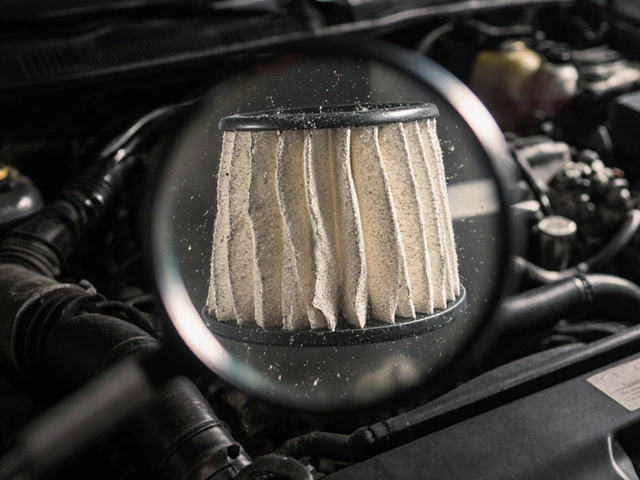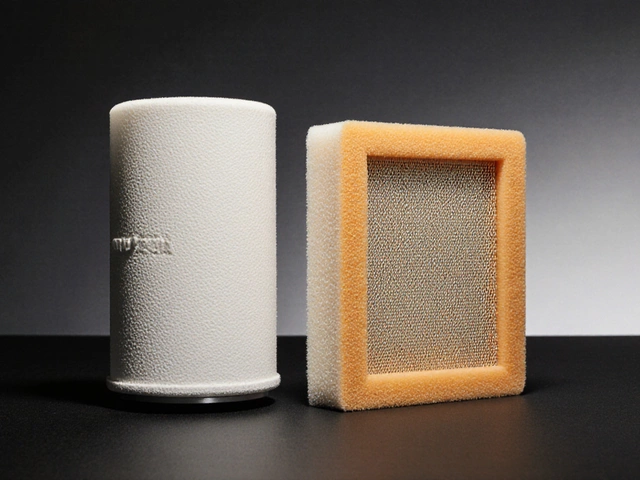In the world of car enthusiasts, the quest for improved performance and unique sound often leads one to consider swapping standard components with high-performance alternatives. One such upgrade is the installation of a performance air filter. While primarily designed to increase the engine's power output by improving airflow, these filters can also cause subtle changes in the sound of a vehicle's exhaust.
This intriguing interplay between the intake and exhaust systems captures the curiosity of many. But, does changing an air filter genuinely alter the exhaust note? The answer might surprise those who expect a dramatic change. As we explore this topic, we'll uncover how these small but mighty components can influence not only your engine's breathability but its voice too.
- Understanding Performance Air Filters
- How Exhaust Sound is Produced
- The Link Between Air Filters and Sound
- Modifications and Sound Impact
- Is it Worth It? Pros and Cons
Understanding Performance Air Filters
Performance air filters are not just about letting your engine breathe freely, they are a marvel of modern engineering aimed at enhancing vehicle performance through improved airflow. These filters, often constructed from cotton gauze, foam, or even specialized fiberglass, are a cut above the conventional paper filters found in most stock vehicles. The fundamental purpose of these devices is to boost the amount of incoming air into the engine, leading to a more complete combustion process and potentially increasing horsepower. By reducing air resistance and filtration clogs, a performance air filter can allow an engine to achieve a higher efficiency level.
It's crucial to note, however, that not all performance air filters are created equal. Some are engineered to capture even the tiniest particles, ensuring that harmful debris stays out while maximizing airflow. This meticulous balance between filtration and flow can be measured by the filter's efficiency rating. For instance, certain manufacturers, like K&N, boast filters that can last up to 50,000 miles before requiring service, which demonstrates both longevity and effectiveness.
According to a renowned auto publication, "A well-maintained performance air filter is akin to an athlete's lung; the cleaner the air intake, the better the performance payoff."
A notable advantage of upgrading to a performance air filter is its reusable nature. Unlike traditional filters, these are designed to be cleaned and reused multiple times, providing cost-effective upkeep over the life of the vehicle. Not only does this ease the maintenance burden, but it is also an eco-friendly option by reducing filter waste. A reusable air filter might initially cost more, but this investment often pays off in terms of longer service life and improved engine function. It appeals to those looking to enhance their vehicle’s capabilities without persistent returns to the auto shop.
The intricacy of installing these filters usually ranges from simple drop-in replacements to more complex systems known as cold air intakes. The latter involves rerouting the air intake path to cooler areas under the hood to further amplify performance gains. Of course, with modification, one must always consider compatibility with other vehicle components to ensure an optimal fit. Known brands will often provide detailed installation guides or access to customer support to guide enthusiasts in making these adjustments.
Ultimately, understanding the true value of a performance air filter extends beyond the initial thrill of horsepower gains. It encompasses ongoing vehicle health, maintenance economy, and an enhanced driving experience. The right filter can transform not only how a car performs but also how it sounds and responds, offering a deeper connection between driver and machine.
How Exhaust Sound is Produced
The distinct symphony that emanates from a vehicle’s exhaust is the result of a complex interplay of sound waves generated within the engine and emitted through the exhaust system. Every engine stroke creates a burst of sound energy as exhaust gases are expelled from the combustion chamber. This journey begins right where the magic happens—the explosions within the cylinders, which push the pistons down. The energy from these explosions travels along the exhaust paths, creating waves that vary in frequency and amplitude.
One critical aspect of any vehicle's exhaust noise is the type of engine architecture it stems from; V8s, for instance, have a rumble that aficionados can recognize from a distance, while four-cylinder engines often produce a higher pitch. As these waves travel through the exhaust pipes, several components play pivotal roles in shaping the final sound. The exhaust manifold funnels these gases into a single pipe, attempting to balance the pressures and produce a smooth flow.
After the gases roar past the manifold, they encounter the catalytic converter, a critical piece engineered primarily to reduce harmful emissions but which can also affect the sound. Following this, the muffler steps into the symphony. Named rightfully so, as it significantly dampens the sound—not merely silencing it, but tuning it to the optimal level approved for road use. Mufflers use a blend of chambers and perforations to reflect sound waves back into themselves, canceling out certain frequencies while amplifying others, shaping the unique sound the car emits.
"The exhaust system is not just about keeping things quiet; it's about enhancing the way your car communicates," says automotive engineer James Peterson, renowned for his work on luxury sports cars.
It's interesting to note how these gases and their resulting sound waves behave. The science behind it aligns with basic acoustics: long wavelength waves pass through the exhaust system effortlessly, while shorter, more scattered waves get canceled out or absorbed. The length and diameter of the exhaust pipes also influence the pitch and volume of the sound. Therefore, even slight alterations to components, such as those involving a performance air filter, can have a noticeable impact on these acoustics.
Interestingly, data suggests that alterations to parts of this system can yield measurable changes. For instance, according to a study we came across, changing the pipes' diameter by just a few millimeters can alter the exhaust note's frequency significantly.
| Component | Effect on Sound |
|---|---|
| Exhaust Manifold | Balances pressure, smooths flow |
| Catalytic Converter | Reduces emissions, can slightly affect tone |
| Muffler | Tunes and reduces exhaust noise |
To conclude, the exhaust sound of a car is not a single note but a multi-layer composition of different frequencies, each shaped by the various parts of the exhaust system. Enthusiasts keen on customizing their vehicle sound often delve into this realm, exploring different components and configurations to craft the perfect auditory experience. Understanding these fundamentals will help any car owner or enthusiast feel more connected to their vehicle and its unique soundtrack.

The Link Between Air Filters and Sound
The connection between a performance air filter and a vehicle's sound is not immediately obvious, yet it is a fascinating one. At the core, these filters are designed to reduce resistance in the air intake system, allowing engines to 'breathe' more freely. By improving how air enters the engine, they slightly alter the combustion process. This can lead to subtle shifts in both engine and exhaust sounds, particularly noticeable under acceleration. However, the degree to which the sound changes can depend on the type of vehicle, the specific air filter used, and the existing exhaust setup. Enthusiasts who are familiar with their car's quirks can often detect these subtle notes in response to new airflow dynamics introduced by a performance air filter.
When it comes to how exhaust sound is produced, it's important to understand how the system works. Exhaust systems carry away the gases produced during combustion, and their design—pipes, mufflers, resonators—directly impacts the sound. A more efficient air filter makes for a smoother and more potent airflow, potentially influencing how these gases are released. The soundscape of a vehicle is thus a symphony created by the interaction between the air intake, engine, and exhaust system. This means any modification to the airflow can ripple through to the exhaust note.
"The sound of a car is a beautiful mix of its engineering and artistic design. When you tweak one part, it can resonate through the entire vehicle," says automotive engineer and sound designer, Timothy Jai.This thought captures the essence of how interconnected the vehicle's parts are. It is similar to tuning a musical instrument—changing one string can adjust the pitch and tone of the overall sound. In the same vein, replacing a basic filter with a performance air filter can enhance—or sometimes even amplify—the vehicle's natural sound characteristics. There have been instances where drivers notice a throaty growl or a deeper hum post-installation. Such auditory changes, while not transforming the sound drastically like a change in muffler might, distinctly alter the character of the vehicle's presence on the road.
For those wondering how to optimize their car for an impactful sound, the combination of performance air filter with other exhaust modifications can bear significant fruit. Some enthusiasts pair these filters with aftermarket exhaust systems to achieve a more profound change. This isn't merely about noise, but about crafting an experience that aligns with the driver’s personal aesthetics and auditory preferences. Always, it's crucial to consider local regulations regarding vehicle noise levels to avoid unwanted fines. A purposeful modification can tick the right boxes for both performance and legal sound limits.
To support the understanding, here's a brief overview. A common setup might include: upgrading the stock air filter to a high-flow option, ensuring the car's exhaust has minimal resistance points, and selecting a muffler that complements the new intake system. It's worth noting that results vary widely based on the make and model of the vehicle, making it beneficial to consult with an automotive specialist or hear firsthand experiences from fellow car enthusiasts.
Modifications and Sound Impact
When considering modifications that alter the exhaust sound of a vehicle, the role of a performance air filter might not immediately spring to mind. Yet, the influence it has is undeniably intertwined with the vehicle's broader system dynamics. In essence, the air filter is the gatekeeper of your engine's air intake system. By switching to a high-performance version, you ensure that more air can enter the engine. This increased airflow promotes a more efficient combustion process, leading to a possible alteration in the vehicle's auditory output. The fundamental mechanism behind this is simple: the engine breathes easier and exhales with a slightly different note.
One might imagine this change to be drastic, akin to the deep rumble of a modified exhaust. However, the transformation is often quite subtle unless paired with other enhancements. If you're chasing a notable change in the vehicle's tone, coupling a performance air filter with other modifications like a free-flow cat-back exhaust system can amplify results. In this scenario, the synergy between better airflow and an unrestrictive exhaust allows for a pronounced acoustical shift, often cherished by automotive enthusiasts.
It's important to understand the mechanics at play here. The more unrestricted airflow into the engine allows for better efficiency, potentially raising the power output slightly. This can lead to engines revving more freely and, hence, producing a different sound spectrum. Let's not forget the science: increased air velocity can mean a higher frequency sound, subtly altering how our ears perceive the engine's voice. For many, this is part of the joy of driving—a more engaging auditory experience.
Notably, larger cones or cold air intake systems can make a difference in tandem with a filter upgrade. Although their main aim is to boost performance by further aiding airflow, the side benefit is a potentially deeper and richer engine note. It's worth noting that while manufacturers like K&N offer models claiming these benefits, the change in vehicle sound may still hinge heavily on your car's specific engine and exhaust setup.
"An engine breathes better with a high-quality air filter, and you'll often notice a richer and more pleasing exhaust note as a result. It’s not just about power; it’s about the entire driving experience shift." - Auto Week Magazine
The effects of these modifications are not uniformly ideal for all vehicles, and it's crucial to tailor them to your specific make and model. Some owners might notice a slight increase in intake noise, which contributes to the overall perception of sound change. This phenomenon, often more audible in turbocharged engines or V6s, is music to the ears for those who appreciate a subtle yet distinct auditory enhancement.
If your quest is to truly customize your car's voice, experimenting with these elements while maintaining an eye on balance and harmony with the engine's natural characteristics is imperative. Remember, the ultimate goal is to achieve a sound that is satisfying, whether that means a pronounced growl or a refined purr. Investing time to know your vehicle's potential and installing components thoughtfully is key to unlocking a sound that leaves the kind of impression you desire.
| Modification | Potential Sound Change |
|---|---|
| Performance Air Filter | Subtle Exhaust Note Change |
| Cat-Back Exhaust | Deeper Tone |
| Cold Air Intake | Richer Engine Note |

Is it Worth It? Pros and Cons
Weighing the decision of whether to install a performance air filter in your vehicle requires a nuanced understanding of its benefits and drawbacks. As with any automotive modification, it's crucial to consider how this change will align with your driving habits and goals. On the pro side, performance air filters promise to enhance your engine's airflow, potentially leading to an increase in horsepower and fuel efficiency. These filters, typically made of high-quality materials like cotton gauze, can capture more dirt and particles while allowing a higher volume of air to pass through. This increased airflow can make your engine more efficient, translating into modest gains in power that car enthusiasts often chase. Additionally, these filters are reusable and environmentally friendly; they can be cleaned and re-oiled instead of replaced, which might save you money in the long run over disposable paper filters.
On the downside, the impact on your vehicle's exhaust sound might not match your expectations. While there can be a slight change in the auditory output, it's typically not significant enough to satisfy those looking for a dramatic shift. Moreover, there's the initial cost to consider, as performance air filters cost more upfront compared to standard filters. There's also the potential for increased wear and tear on your engine if the filter isn't maintained properly, as a neglected filter can allow dirt to bypass, leading to engine damage.
It's also worth reflecting on some of the empirical data regarding these filters. For instance, studies have shown that the increase in horsepower from a performance air filter is typically around 1% to 4%, which, while measurable, may not be noticeable in everyday driving. Conversely, the reusability factor significantly contributes to its sustainable appeal. A performance air filter can often pay for itself over time through its reusability, leaving a smaller environmental footprint due to less waste from discarded filters.
According to a well-regarded automotive engineer, "A performance air filter can enhance your engine's efficiency subtly but noticeably over time. It's not merely about the immediate power gains but about improving the engine's ability to breathe under varied conditions."
Ultimately, whether a *performance air filter* is worth the investment largely depends on personal preference and usage patterns. For the enthusiast seeking every possible edge in performance, the filter can be an ally in achieving those goals. For the casual driver, the decision might rely more on the environmental benefits and long-term cost savings. Balancing these factors is key to determining whether the swap aligns with your expectations and priorities.




